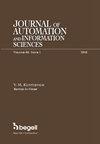专家决策系统
Q3 Engineering
Journal of Automation and Information Sciences
Pub Date : 2021-11-01
DOI:10.34229/1028-0979-2021-6-11
引用次数: 0
摘要
在构建标准函数回归模型所需的实验统计数据信息不足(或没有)的情况下,提出了一种做出复杂技术和经济决策的方法。当根据几个相互冲突的质量标准做出决定时,情况会恶化。在实验数据严重短缺的情况下,建议从专家那里获得必要的信息(“准实验”数据),这些专家在为相关类别做出决策方面具有足够的经验。一个有足够决策经验的合格专家(专家)可以进行思想实验。他必须想象,在他看来,在各种因素的参考点上,标准函数的水平会是什么。该方法基于专家根据其专业经验对估计值表达的个人意见(假设)。为了评估某个定量特征,使用的不是一个,而是几个在这个问题上有能力的人的假设。假设未知定量特征的“真实”值在专家评估的范围内,“广义”集体意见更可靠。为了解决所考虑的问题,采用了一种使用非线性权衡方案的多准则优化方法。这项研究使得在缺乏(或缺乏)实验数据的情况下,确定多标准决策系统发展的主要趋势成为可能。给出了一个模型实例。本文章由计算机程序翻译,如有差异,请以英文原文为准。
EXPERT DECISION-MAKING SYSTEMS
An approach to making complex technical and economic decisions is proposed in cases where there is insufficient (or no) information about the experimental statistical data necessary for the construction of regression models of criterion functions. The situation is aggravated when a decision is made according to several conflicting quality criteria. In conditions of an acute shortage of experimental data, it is proposed to obtain the necessary information («quasi-experimental» data) from experts - specialists with sufficient experience in making decisions for the class in question. A qualified specialist (expert) with sufficient experience in making decisions for this class can perform a thought experiment. He must imagine what, in his opinion, the levels of criterion functions will be at various reference points of factors. The method is based on an individual opinion (postulate), expressed by a specialist-expert about the estimated value, based on his professional experience. To assess a certain quantitative characteristic, the postulates of not one, but several persons competent in this issue are used. It is assumed that the «true» value of the unknown quantitative characteristic is within the range of expert assessments and the «generalized» collective opinion is more reliable. To solve the problem under consideration, a multicriteria optimization approach is taken using a nonlinear trade-off scheme. This study makes it possible to identify the main trends in the development of multi-criteria decision-making systems in the absence (or lack) of experimental data. A model example is given.
求助全文
通过发布文献求助,成功后即可免费获取论文全文。
去求助
来源期刊

Journal of Automation and Information Sciences
AUTOMATION & CONTROL SYSTEMS-
自引率
0.00%
发文量
0
审稿时长
6-12 weeks
期刊介绍:
This journal contains translations of papers from the Russian-language bimonthly "Mezhdunarodnyi nauchno-tekhnicheskiy zhurnal "Problemy upravleniya i informatiki". Subjects covered include information sciences such as pattern recognition, forecasting, identification and evaluation of complex systems, information security, fault diagnosis and reliability. In addition, the journal also deals with such automation subjects as adaptive, stochastic and optimal control, control and identification under uncertainty, robotics, and applications of user-friendly computers in management of economic, industrial, biological, and medical systems. The Journal of Automation and Information Sciences will appeal to professionals in control systems, communications, computers, engineering in biology and medicine, instrumentation and measurement, and those interested in the social implications of technology.
 求助内容:
求助内容: 应助结果提醒方式:
应助结果提醒方式:


